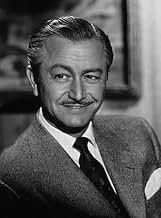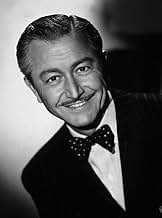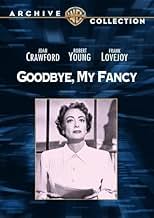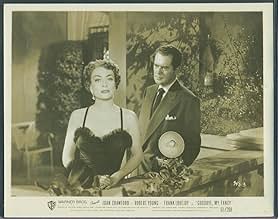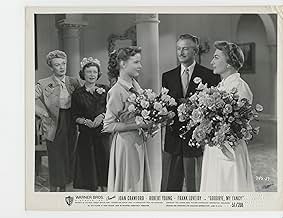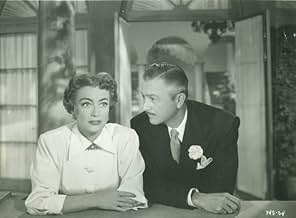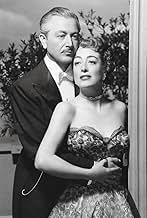NOTE IMDb
6,0/10
1 k
MA NOTE
Ajouter une intrigue dans votre langueCongresswoman returns to college to reignite romance with president, facing rival and her controversial film threatening his job.Congresswoman returns to college to reignite romance with president, facing rival and her controversial film threatening his job.Congresswoman returns to college to reignite romance with president, facing rival and her controversial film threatening his job.
- Réalisation
- Scénario
- Casting principal
- Récompenses
- 1 victoire au total
Leah Baird
- Party Guest
- (non crédité)
George Bunny
- Janitor
- (non crédité)
Mary Carver
- Joan Wintner
- (non crédité)
Beulah Christian
- Party Guest
- (non crédité)
James Conaty
- Party Guest
- (non crédité)
Frank Conlan
- Frank
- (non crédité)
Avis à la une
As a devoted fan of old movies which were released when I was a little boy and in those days already an ardent film fan and moviegoer, I was highly surprised to see this film on TCM today because I had never heard of it. But I was certainly glad to have finally caught up with it. As the plot unfolded it became obvious that this must have been originally a finely crafted stage play from the way it led you sympathetically from one character to another and kept you in complete suspense as to different possible denouements for the action. In fact it reminded me of some of Terrence Rattigan's finer plays. But now I see that the play was written by the wife(?) of Garson Kanin. I thoroughly agree with the first review that the romantic side of the plot, though very touching, was by no means all there was to it. Strong statements on wider issues such as academic freedom, ability of big money to call the educational tune, the growing up out of illusions which must be discarded (very Ibsen or George Bernard Shaw) all were pithily and dramatically dealt with and skillfully presented to the audience. The side roles (especially Eve Arden) were all brilliantly executed in that wise-cracking, zany style that made the plays of the 1920s and 30s such favorites. And the main leads (Crawford, Young, etc) were equally outstanding in their emotional portrayals. This film was at least 10-15 years ahead of its time. When the 1960s finally rolled around American youth finally took the blinders off just the way Kanin and the makers of this film advocated. A brilliant and enthralling accomplishment. I wish we could all personally congratulate all the makers of this film of 50 years ago.
"Goodbye, My Fancy" stars Joan Crawford, Robert Young, Eve Arden, and Frank Lovejoy and was made in 1951. It was originally a play by Fay Kanin that enjoyed a run of over a year. Madeleine Carroll starred.
Crawford in 1951 was 44, and in those days, after an actress turned 30, she went into supporting roles. It's to Crawford's credit that she stayed a leading lady well past 30, albeit in lesser films.
This film is actually a good one. Crawford plays a Congresswoman, Agatha Reed, who is invited back to her old college to receive an honorary degree. She is thrilled, for more than one reason.
Agatha has happy memories there and has never forgotten her old love and, though she doesn't state it, she's hoping to see him again. Also, she finds it amusing that she's been invited -- she was expelled from the school for staying out all night and didn't graduate.
Agatha and her able assistant (Eve Arden) travel to the college, dogged the entire way by a photographer (Frank Lovejoy) with whom Agatha had an involvement a few years back.
Agatha has filmed a documentary that she wants to show at the school. The film is about what happens when people are denied their freedoms, and deals with book burnings, persecution of teachers, etc. She is shocked to find that there is some question as to whether or not the film will be shown.
"Goodbye, My Fancy" is about going home again, and underneath Agatha having two men interested in her, it makes a statement about McCarthyism which was so rampant at the time. It's also about standing up for what you believe in and having integrity -- true ethics kick in when you've got something to lose.
I saw some comments about Crawford being miscast - I'm not sure why - she played strong career women for many years.
The casting is off, but it's not Crawford. It's partly the script and partly the casting. Robert Young is very good as the President -- handsome, charming, and formal.
Eve Arden is funny as the assistant, wisecracking her way through the role. Shirley Booth played the role on Broadway.
The role that's miscast is Frank Lovejoy as Matt Cole. The role called for a macho, attractive tough guy and instead we get the rather sloppy, wisecracking Lovejoy. The ending of the film seemed to come out of nowhere.
Otherwise, fairly enjoyable, good cast.
Crawford in 1951 was 44, and in those days, after an actress turned 30, she went into supporting roles. It's to Crawford's credit that she stayed a leading lady well past 30, albeit in lesser films.
This film is actually a good one. Crawford plays a Congresswoman, Agatha Reed, who is invited back to her old college to receive an honorary degree. She is thrilled, for more than one reason.
Agatha has happy memories there and has never forgotten her old love and, though she doesn't state it, she's hoping to see him again. Also, she finds it amusing that she's been invited -- she was expelled from the school for staying out all night and didn't graduate.
Agatha and her able assistant (Eve Arden) travel to the college, dogged the entire way by a photographer (Frank Lovejoy) with whom Agatha had an involvement a few years back.
Agatha has filmed a documentary that she wants to show at the school. The film is about what happens when people are denied their freedoms, and deals with book burnings, persecution of teachers, etc. She is shocked to find that there is some question as to whether or not the film will be shown.
"Goodbye, My Fancy" is about going home again, and underneath Agatha having two men interested in her, it makes a statement about McCarthyism which was so rampant at the time. It's also about standing up for what you believe in and having integrity -- true ethics kick in when you've got something to lose.
I saw some comments about Crawford being miscast - I'm not sure why - she played strong career women for many years.
The casting is off, but it's not Crawford. It's partly the script and partly the casting. Robert Young is very good as the President -- handsome, charming, and formal.
Eve Arden is funny as the assistant, wisecracking her way through the role. Shirley Booth played the role on Broadway.
The role that's miscast is Frank Lovejoy as Matt Cole. The role called for a macho, attractive tough guy and instead we get the rather sloppy, wisecracking Lovejoy. The ending of the film seemed to come out of nowhere.
Otherwise, fairly enjoyable, good cast.
Goodbye My Fancy finds Joan Crawford taking over a role popularized by fellow film star Madeline Carroll on stage as a member of the House Of Representatives coming back to her former college to accept an honorary degree. She's invited by college president and former boyfriend Robert Young.
There's a lot of history here and this is the only degree she'll have from the College Of New Hope for women located in rural New England. Back in the day apparently Crawford was a wild child, at least wild by those standards back then. She got into a compromising situation with Young and she took the fall by herself and got expelled for it. In the interim Young in addition to rising to the presidency of the college married a woman who died and has a daughter, Janice Rule, who is going to be one of the graduates at the ceremony Crawford gets her degree.
Crawford went into journalism and then politics. She's combining the two at this point having produced a documentary about the current social problems of Europe and how Fascism by curtailing free speech contributed mightily to them. She's hoping to show the film while she's at the college.
Her opponent in this endeavor is the chairman of the board Howard St. John who also happens to be now married to Crawford's former roommate Lurene Tuttle. He's got the part that actors like Eugene Palette and Charles Dingle normally were cast in, the arrogant, self righteous right wing blowhard who thinks he ought to be controlling the educational process. Not that he's against free speech mind you, but he feels that kids should not be exposed to this kind of serious work. He in fact donated the campus movie theater and he'd like for them to show entertainment that he approves of, such as his favorites Abbott&Costello.
Young's dependent on St. John's good will for his job. But one who isn't and is also a rival for Crawford is Frank Lovejoy, a Time&Life war photographer who is covering this event. He'll expose Young's timidity if for no other reason than to shame him in front of Joan.
Goodbye My Fancy was written by Fay Kanin and ran for 446 performances on Broadway during the 1948-49 season and was directed by Sam Wanamaker who also played the Frank Lovejoy part. The college president was played by another former movie name, Conrad Nagel.
The play took home a Tony Award for Shirley Booth who played Crawford's Congressional aide and has some really funny Eve Arden type lines. When the film came out the Eve Arden part was played by Eve Arden.
The play draws heavily on themes expressed in James Thurber's The Male Animal. If anything it's more serious here because whereas in The Male Animal, trustee Eugene Palette objected to the content in reading Nicolo Sacco's letter in class, St. John just objects to the idea of material that is mind challenging in the classroom in general. What does this imbecile think they're going to college for. In fact there's a minor role played by Morgan Farley as a physics professor who is intending to leave the college because of the limits he's being put under and Farley plays it well.
Coming out as it did during the House Un-American Activities Committee days and after Joe McCarthy started finding Communists in all kinds of places, Goodbye My Fancy was quite the courageous project for Warner Brothers at the time. It's a timeless tribute to the value of free speech and the marketplace of ideas that a university is supposed to be.
This is a film that I think needs a remake. Can you see some trustee on a university today throwing his weight around and maybe filling the campus cinema with reruns of Saturday Night Live in order that students not concentrate on serious issues?
I think it could be done.
There's a lot of history here and this is the only degree she'll have from the College Of New Hope for women located in rural New England. Back in the day apparently Crawford was a wild child, at least wild by those standards back then. She got into a compromising situation with Young and she took the fall by herself and got expelled for it. In the interim Young in addition to rising to the presidency of the college married a woman who died and has a daughter, Janice Rule, who is going to be one of the graduates at the ceremony Crawford gets her degree.
Crawford went into journalism and then politics. She's combining the two at this point having produced a documentary about the current social problems of Europe and how Fascism by curtailing free speech contributed mightily to them. She's hoping to show the film while she's at the college.
Her opponent in this endeavor is the chairman of the board Howard St. John who also happens to be now married to Crawford's former roommate Lurene Tuttle. He's got the part that actors like Eugene Palette and Charles Dingle normally were cast in, the arrogant, self righteous right wing blowhard who thinks he ought to be controlling the educational process. Not that he's against free speech mind you, but he feels that kids should not be exposed to this kind of serious work. He in fact donated the campus movie theater and he'd like for them to show entertainment that he approves of, such as his favorites Abbott&Costello.
Young's dependent on St. John's good will for his job. But one who isn't and is also a rival for Crawford is Frank Lovejoy, a Time&Life war photographer who is covering this event. He'll expose Young's timidity if for no other reason than to shame him in front of Joan.
Goodbye My Fancy was written by Fay Kanin and ran for 446 performances on Broadway during the 1948-49 season and was directed by Sam Wanamaker who also played the Frank Lovejoy part. The college president was played by another former movie name, Conrad Nagel.
The play took home a Tony Award for Shirley Booth who played Crawford's Congressional aide and has some really funny Eve Arden type lines. When the film came out the Eve Arden part was played by Eve Arden.
The play draws heavily on themes expressed in James Thurber's The Male Animal. If anything it's more serious here because whereas in The Male Animal, trustee Eugene Palette objected to the content in reading Nicolo Sacco's letter in class, St. John just objects to the idea of material that is mind challenging in the classroom in general. What does this imbecile think they're going to college for. In fact there's a minor role played by Morgan Farley as a physics professor who is intending to leave the college because of the limits he's being put under and Farley plays it well.
Coming out as it did during the House Un-American Activities Committee days and after Joe McCarthy started finding Communists in all kinds of places, Goodbye My Fancy was quite the courageous project for Warner Brothers at the time. It's a timeless tribute to the value of free speech and the marketplace of ideas that a university is supposed to be.
This is a film that I think needs a remake. Can you see some trustee on a university today throwing his weight around and maybe filling the campus cinema with reruns of Saturday Night Live in order that students not concentrate on serious issues?
I think it could be done.
A great movie with three of my favorite movie stars: Robert Young, Eve Arden and Joan Crawford. This movie makes no concessions whatsoever to "popular" taste. It doesn't insult one's intelligence. It makes a passionate plea for free speech. Some would surely call it communist propaganda. Joan Crawford was however absurdly miscast as a flaming liberal politician. The real Joan was, I think, conservative. She ended her life as the chair of Pepsi! But somehow she captivates. Her diction is solid, her acting measured, always dignified, and her movies are darn good (she never played the Queen of Sheba, or some other "historic" nonsense). Robert Young is impeccable too, far more impressive, intelligent, than a whole host of bigger stars, but his non-muscular persona confines him to the parlor. I can hardly believe he was an alcoholic.
I thought STORM CENTER (1955) was the first free speech movie. Still, the fact remains, that STORM CENTER is more direct, powerful, dramatic and dashing. Unfortunately, the censors seems to have had the last word about THAT anti-censorship film. STORM CENTER has never been shown on TV (as far as I know) and it is not available on video. Something should be done to bring back this and other forgotten classics.
I thought STORM CENTER (1955) was the first free speech movie. Still, the fact remains, that STORM CENTER is more direct, powerful, dramatic and dashing. Unfortunately, the censors seems to have had the last word about THAT anti-censorship film. STORM CENTER has never been shown on TV (as far as I know) and it is not available on video. Something should be done to bring back this and other forgotten classics.
This was one of Crawford's last films under her Warner Brothers contract and was probably here first big box-office failure since her MGM days eight years earlier. The film is not too bad, but not as good as "Mildred Pierce," "Possessed" or "Flamingo Road." Crawford plays a congress woman who returns to her alma mater to receive an honorary degree, but finds romance with professor Robert Young.
Le saviez-vous
- AnecdotesOne of the first films to show a woman with a shoulder strap purse.
- GaffesAgatha picks up a cigarette and table lighter just before Dr. Pitt comes into her room. She stands and holds them both, the cigarette unlit for the remainder of the scene.
- Citations
Agatha Reed: We were a nice snapshot but never a family portrait.
- ConnexionsFeatured in Le point de rupture (1994)
Meilleurs choix
Connectez-vous pour évaluer et suivre la liste de favoris afin de recevoir des recommandations personnalisées
- How long is Goodbye, My Fancy?Alimenté par Alexa
Détails
- Date de sortie
- Pays d’origine
- Langue
- Aussi connu sous le nom de
- Goodbye, My Fancy
- Lieux de tournage
- Société de production
- Voir plus de crédits d'entreprise sur IMDbPro
Box-office
- Budget
- 1 312 000 $US (estimé)
- Durée
- 1h 47min(107 min)
- Couleur
- Rapport de forme
- 1.37 : 1
Contribuer à cette page
Suggérer une modification ou ajouter du contenu manquant


